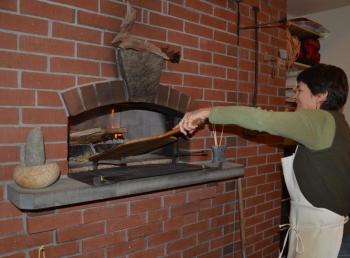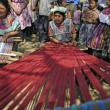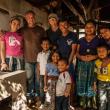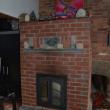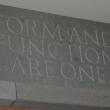The World Health Organization calls them the forgotten three billion, those women around the world who spend much of their day bent over open cook fires. They burn wood, animal dung and crop waste, whatever can be found. And every year, four million women and children die prematurely from pneumonia, lung disease and cancer because of sooty air rising from those fires, says WHO. These women are among the world's poorest. They are marginalized, without resources to change debilitating lifestyles.
But Patrick Manley thinks about them a lot. He lives in Washington, and is a mason who builds fireplaces and brick ovens throughout the country. He understands the significance of simple change, like building efficient brick stoves and installing them, with their metal chimneys, in the homes of those families. It is a mission he intends to carry forward the rest of his own life.
At his home overlooking a field of fresh February snow, Manley is busy getting ready for his 17th year of leading volunteers on a March trip to the highlands of Guatemala. There, the group of 30 volunteers — masons, carpenters, lawyers, teachers, engineers, adventurers — will build at least 40 new cook stoves for villagers.
Some of the volunteers have been making these trips with him for many years. They take it upon themselves to raise funds for the trip, and to contribute money toward the cost of the stoves, which are approximately $150 each to build and install.
The stoves are of basic design; box-shaped and constructed with bricks. The steel pipes are fitted through holes in the roof, and the stoves are then finished with a metal stove top, even with burners.
The volunteers, mostly from Maine, some from other states, fly to Guatemala City, board buses and then a large lake boat to reach their destination in the villages surrounding Lake Atitlan, at an altitude of approximately 5,000 feet. For the past two years, Manley has expanded his time in Guatemala to take another group, a smaller one consisting of students from Hillsboro Community College in Tampa, Florida. Those students are part of the schools honors program, run by UMaine Augusta's former honors program organizer Kathleen King.
Working in teams of three, the volunteers will fan out daily through those villages, meet with the women leadership ("men don't have a clue," said Manley), and determine in which home a stove is to be built that day. Then they will spend the day taking handmade bricks that are made from spall — volcanic pumice — and carefully shaping stoves.
The families participate, as well, helping to supply water, screen sand, and dip bricks in water.
The Maya Indians live in in the villages, cultivating and harvesting corn, onions and potatoes in the nearby fields. Their homes are shacks, some sheathed with wood planks, others constructed from cement blocks, still others made with adobe and stickers plastered with mud.
In the those highlands, considered the core homeland for the Maya, the Indians move from fields to villages in their beautiful and colorful fabrics, bearing cultural legacies of their turbulent, proud and mysterious history.
It is a subsistence lifestyle, and inside their small homes, mothers lean over big vats of boiling corn, or flip tortillas on round steel drum lids perched atop three-stone fires.
Babies ride on their backs in slings, and nearby, toddlers mess around. Sometimes they get burned by the coals and hot rocks of the open fireplaces; often, their mothers get cooking burns on their arms and hands.
When those mothers lean forward, their babies do, too, and they all inhale hot fumes rising from the fireplace.
According to WHO, more than 50 percent of premature deaths due to pneumonia among children under age five are caused by soot inhaled at home.
To learn more about Masons on a Mission, and to donate to their efforts, visit
masonsonamission.org or Facebook.com/MasonsOnAMission
"A woman, if she's lucky, won't be blind by the time she's 40," said Manley.Their eyes smart from the acrid smoke, and their vision dims.
Masonry comes naturally to Manley. Now in his 60s, he has been refining his skills since he was 17 years old, when he first started in the business while living on the Connecticut coast.
To Manley, form and function are one, a philosophical tenet by which he lives and works, whether he is building a pizza oven for a restaurant a masonry heater for a new home, or a modest kitchen stove for a Maya. He is happiest when he is working with mud, bricks and fire, and the Masons on a Mission trips are a regular part of his life.
He works with one simple humanitarian goal: "To get rid of the fires that are making people sick," he said.
Manley arrived in Maine in Summer 1969, right after high school graduation. He was in a car with friends, searching for Woodstock, the defining hippie concert in upstate New York.
'We never made it," he said.
Instead, he found Maine. Those days before GPS were different, and the highways for teenagers were far less straight shots to a destination than they are now. Fate and a Volkswagen minibus with Camden drivers Duncan Syme (founder of Vermont Castings woodstoves, and Steve McLaughlin, landed him in the Midcoast.
"Camden was a little different, then," said Manley.
At first, he built boats on Howe Hill Road. Later the fall, he returned to Connecticut. But the tug of Camden pulled him back north.
"That November, I decided I was going to move to Maine," he said.
He returned and rented a room in a boarding house on the corner of Mechanic and Washington streets.
His friend, Steve, let him borrow the car, and Manley explored. He found the swimming hole on Appleton Ridge, renowned for its unabashed approach to swimsuits. Maine had a lifestyle he liked.
"I didn't want to live in Connecticut," he said. "I went to work at Roakes picking eggs. There was a big industrial fan in the barn, and it chopped on my finger and thumb. I wasn't paying attention to what I was doing. In the hospital, I set goals and got back on track."
He returned to Connecticut, worked as an apprentice for a mason there for two years, and then returned to the Midcoast.
In Spring 1974, he moved to Washington and bought nine acres. Later, he bought more land, putting 24 acres under his name. He built a cabin and created a homestead — really, a workshop with a tower, a place for a creative mind to let loose, and construct.
In those years, he was drawn to masonry heaters, and he thought much about fire and its place in the history of mankind.
"It's something that some guy was dealing with 2,000 years ago, and there I was, too," he said. "There's a connection. I am doing something that is pretty basic and simple."
Manley's pragmatic nature shines through all he does, and he marvels at the world. He eats lunch for free until he dies at Cafe Miranda, in Rockland, because he built the oven there that helped make much of that restaurant what it is today.
Miranda owner Kerry Altiero sweeps in the door, sees Manley, and gives him a deep, respectful handshake and slap on his shoulder.
"This guy is the best," Altiero said, and means it.
Manley doesn't crack a smile that much, but his eyes lighten when he appreciates something. He has a plate of salad, but he's not eating, so engaged with the story he is telling. He spins over the past 800 years of history, all in the framework of how humans have cooked their food, from Medieval times to the Little Ice Age, when humans denuded the European landscape of trees to stay warm ("There was a pall over the continent, from burning green wood," he said). He then moves to the Central American mountains, where the Spaniards pushed the native Maya back up from the fertile lowlands to the mountains, forcing adaptation to a harsher climate.
Well into his career as a Maine mason, Manley was also president of the Masonry Heater Association. An email arrived in 2000, from Canadian carpenter Tom Clarke, asking if any masons wanted to travel to Central America and build cook stoves.
"He said he was leaving in four days," said Manley. "I'm thinking, yes. I'll go anywhere if it has something to do with bricks and mud and fire."
He left in a snowstorm and arrived in Guatemala City at 10 p.m., with rudimentary Spanish.
"It was a little unnerving," he said.
The next day, he traveled to Xela, Guatemala's second largest city, arriving at night. From that initial immersion 17 years ago, he is now a regular, with an extensive network of friends and associates in region of Central American that draws visitors from all over the world.
"The first year, I was motivated by the project and saw it as a way to give back," said Manley. "In 2001, we were doing it again, with three or four other masons. Each year, it got a little bigger."
Manley eventually parted ways with Clarke, who continues to build stoves in Guatemala, as well. Manley formed his own nonprofit, Masons with a Mission, built a website, set up a Facebook page, and continues his roll and role in work he sees no end to.
Sometimes, the mission branches out to help others with healthcare and education. Miguel is the nonprofit's mason in Guatemala, and he and his wife have two children, Eddy 11, and, Myra, 15.
Eddy was born with minor cerebral palsy. One of his legs were crossed over the other and did not function. The only way Eddy moved from one place to another is by being carried by one of his parents,or he crawls.
Two years ago, one of the Masons on a Mission volunteers told Manley that he and his family were well off, and they had just received an inheritance that they did not really need.
"He wanted to use it to do whatever possible in order to help Eddy to walk," said Manley. "Long story short, we brought Eddy and his parents to Maine a few summers ago to be evaluated at Mass General, through the Shriners. His bad leg was operated on and had his leg in a cast for six weeks, then for physical therapy in Maine most of the summer. We brought Eddy here again last spring for more surgery on his hip and ankles. Eddy now walks, with crutches or with his mother's assistance, but he is up off of the floor and standing on his own two feet for the first time ever."
Manley said he hoped Eddy would be back in two years for hip surgery after he grows as much as he will grow.
"He is behind in school, and socially, because of his affliction. MOM is funding private school lessons to catch him up," said Manley. "We are all looking forward to seeing his progress next month."
Raising money to build stoves in Guatemala is a constant task for Manley. He asks his volunteers to each raise $300 to build two stoves. Some volunteers raise far more than that, the record is $5,000. Others get their churches involved, or generous friends.
"I could go on, there are many good stories, but I know that you get what I mean," said Manley. "I think it all averages out to well over $300 per volunteer. It takes genuine enthusiasm to persuade most people to make any size donation. I have been amazed over the years of how generous people can be when they feel, and believe their contribution will make a real difference."
Volunteers going this year include Susan and Greg Dorr, of Camden; are Joe Godfrey, of South Thomaston; Peter and Patti Berke, of Camden' Bill and Barb Babb, of Edgecomb; Stu Silverstein, of Waterville; Steve Chadbourne, of Manchester; Lori Kneiser, of Washington; David Engler, of Bowdoinham; and Wyatt Picard, of Hampden.
He doesn't anticipate expanding his essential mission or to grow the nonprofit. There are other organizations that help in different ways, like the group of volunteers that builds outhouses from refuse plastic that covers a good portion of the earth and oceans.
"I'm comfortable going with the flow," he said. "I'll never be finished. I can build stoves for the rest of my life and never be done."
He smiles.
"I look forward to building stoves the rest of my life. As far as I am concerned, the only reason (if there is such a thing) we all exist is to make a real difference while we are here."
Reach Editorial Director Lynda Clancy at lyndaclancy@penbaypilot.com; 207-706-6657





